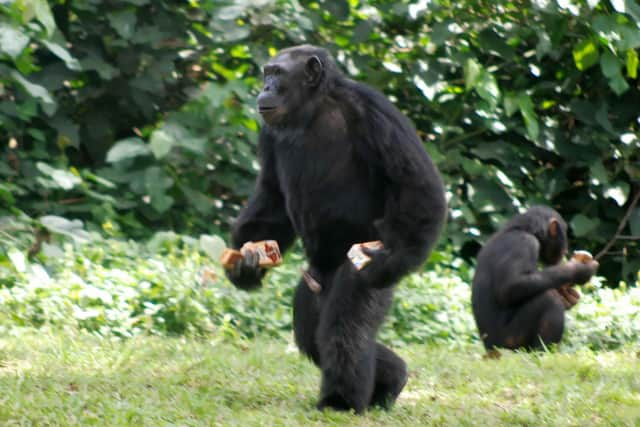What causes chimpanzee turf wars? Fights in Netflix show Chimp Empire - dubbed Succession for apes - explained
and live on Freeview channel 276
A new documentary series called Chimp Empire has just been released on Netflix deep diving into the fascinating and complex world of chimpanzees.
The four-part series takes a look at the largest society of the great ape species as they navigate social politics, family dynamics, and territorial disputes.
Advertisement
Hide AdAdvertisement
Hide AdJames Reed, the director of the series, alongside his crew and a squad of on-the-ground scientists and field trackers spent over a year shooting the Ngogo chimps in Uganda’s Kibale National Park.
Shot in the remote rainforest, Chimp Empire exposes the lives of chimpanzees that have never been seen on film before.
The series follows the Ngogo community, the largest known group of chimpanzees in the world.
At the time of filming, it had splintered into two competing factions to “fight” for territories and the filmmakers were on the front lines for the life-or-death fight for supremacy between the Central and Western groups.
Advertisement
Hide AdAdvertisement
Hide AdThe rivalry between these two factions climaxed in a confrontation the filmmakers and scientists describe as the “Battle of Ngogo”.
Capturing the Ngogo chimps in combat took months of dogged tracking as during moments of heightened aggression chimps move through the forest at flying speeds.
Director Reed told Netflix that the camera crew were able to capture stunning scenes of chimp combat but there was “nothing you could do” when they saw a vulnerable primate killed.
The filmmakers were able to capture the intimacy of warring chimps in the wild because they were in an environment long marked by human activity.
Advertisement
Hide AdAdvertisement
Hide AdResearchers had constantly swarmed the area and so the chimps saw the crew “as an extension of the presence that’s been in the forest for years,” Reed said.


‘They’re so human’
When the fights were occurring in front of the camera crew, Reed told Netflix it was “difficult to watch” but they are “territorial animals” and they couldn’t intervene.
He said: “I think once you’ve filmed with these chimps for any amount of time, you understand how it’s not a practical option. There’s nothing you could do. And you feel there’s nothing you should do, either.
“Because as much as we might find it difficult to watch, this is a natural part of chimpanzee life and behaviour. They are territorial animals, and they’ll fight for those territories.”
Advertisement
Hide AdAdvertisement
Hide AdReed said the death of a chimp feels tragic when watching the series as it may remind viewers of human life too.
He added that he hopes the project will make viewers come away considering the questions “‘Are we better than chimps in resolving conflicts? When are we actually just as bad? When are they better? As a species, how far have we come?’”
Reed said being surrounded by the Ngogo chimps was “like being on The Truman Show or something” because “you can’t quite believe they’re real.”
He told Netflix: “I remember suddenly being aware that the Ngogo chimps were all around. It’s like being on The Truman Show or something — you feel like you’re on a set, because you can’t quite believe they’re real. They’re so human, you know that they’re assessing you in the same way that you’re assessing them.
Advertisement
Hide AdAdvertisement
Hide Ad“You can’t quite believe that they accept you into their world. You go where they go, but they make all the decisions.”
He added: “The only thing you can control is where you turn your cameras, or whether you keep up with the action. It’s quite humbling, and I quite like it.
“The only thing you can do is put yourself in the best position possible to record what they’re doing.”
Why do chimpanzees fight?
A major study of warfare in chimpanzees has found that lethal aggression can be evolutionarily beneficial, rewarding the winners with food, mates, and the opportunity to pass along their genes.
Advertisement
Hide AdAdvertisement
Hide AdThe findings contradict claims that chimps only fight if they are stressed by the impact of nearby human activity - and it could help explain the origins of human conflict.
Since primatologist Jane Goodall’s pioneering work at Gombe Stream National Park in Tanzania in the 1970s researchers have been aware that male chimps often organise themselves into warring gangs that raid each other’s territory.
Primatologists have concluded that their territorial battles are evolutionarily adaptive.
The study discovered that the most important predictors of violence were related to five aspects: the species, age and sex of the victims and their attackers, as well as community membership and demography.
Advertisement
Hide AdAdvertisement
Hide AdResearcher Jill Pruetz, professor of anthropology at Iowa State University, said in the study it is likely that the killings are related to helping the attackers increase their reproductive success.
She said: "For example, Ngogo is a huge chimp community in Uganda and they have a huge number of males. What they’ve seen there is more lethal events than any other sites."
The team found that human activities did not have a significant impact on aggression.
Comment Guidelines
National World encourages reader discussion on our stories. User feedback, insights and back-and-forth exchanges add a rich layer of context to reporting. Please review our Community Guidelines before commenting.
